Do you need a table saw? Let us help you find one!
With so many tables and choices, buying one can be daunting. Let us admit it: from rip capacity to prices and blade size to proper use, knowing how to choose the best table saw can be confusing. Trust us, we have all been there. But we are here to help you make the process a bit easier by breaking down the table saw purchase decision into four steps, making the process much easier.
We will get right to the chase and give you a quick guide to choosing the best table saw. However, if you want to learn more about the process, we encourage you to scroll past this guide and get into the guts of choosing the best table saw with these four.
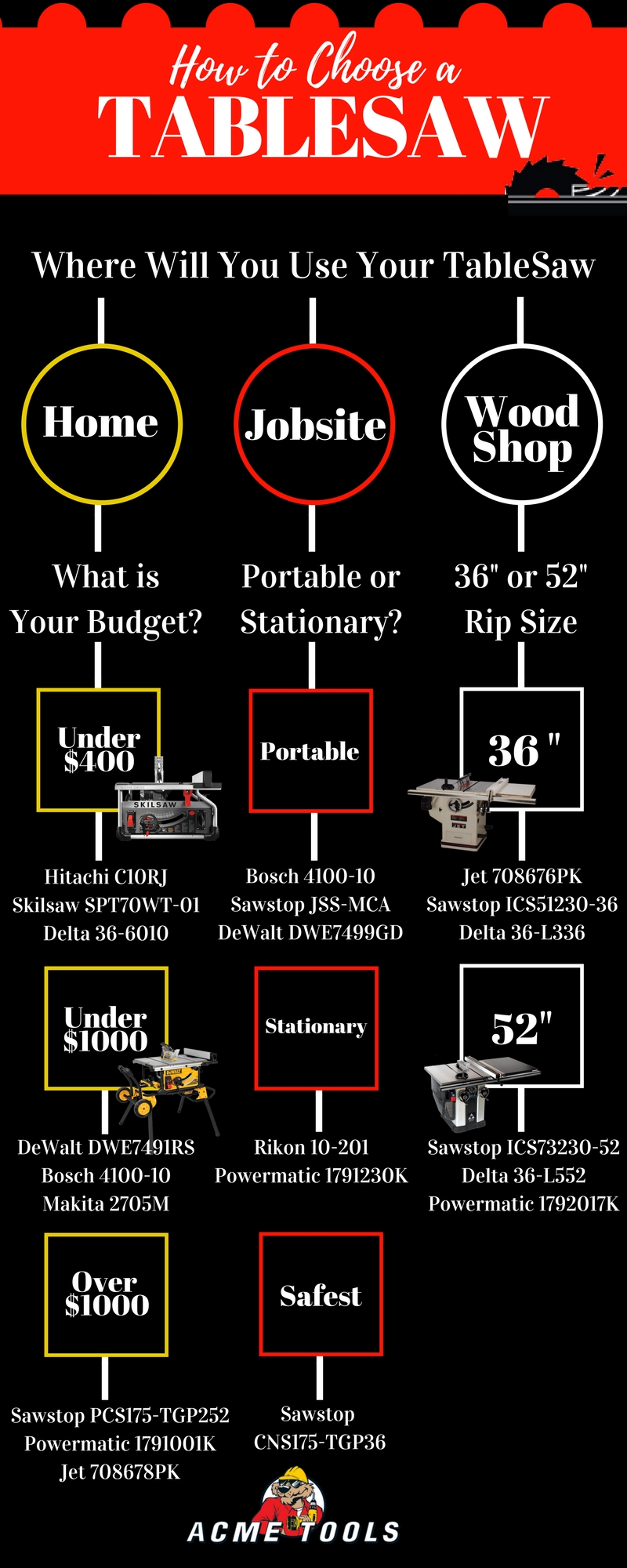
Four Steps to Choosing a Table Saw
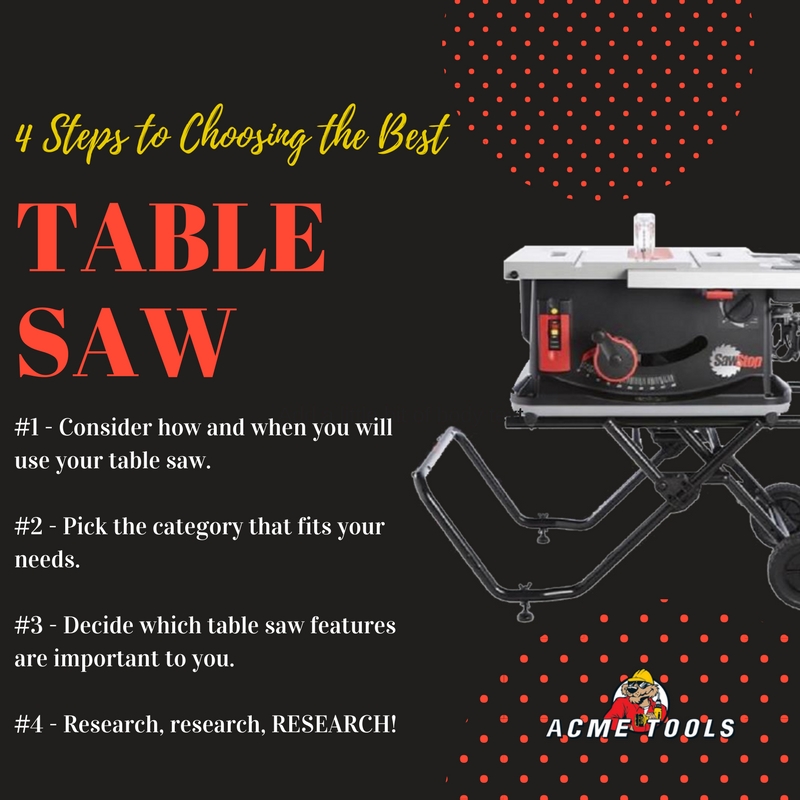
Step #1: Consider where and how it will be used!
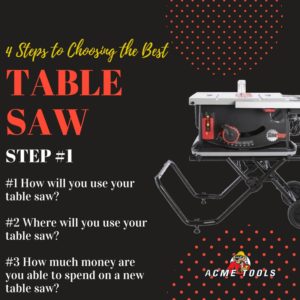
Before shopping for a table saw, knowing what you are looking for is essential. This will help you educate yourself about what you need and prevent you from wandering around the store pondering what you need: get in and get out (because time is money, right). So do yourself a favor and take a moment to ponder these three essential things:
- How will you be using your table saw?
- Where will you use your table saw?
- What amount of money are you planning to spend?
How Will You Be Using Your Table Saw?
- What kind of cuts will you be making?
- How many cuts will you be making?
- How frequently will you be cutting using your table saw?
Where Will You Be Using Your Table Saw?
- How much space will you have to store your table saw?
- Will it be in a spacious, dedicated home shop?
- Will it be stored away in the garage after use?
- Do you need it to be mobile and easy to transport?
How Much Do You Plan To Spend On a New Table Saw?
Having a set budget in mind can help you quickly narrow down and weed out which table saws may or may not be for you. As with anything, the price ranges for table saws vary greatly. You can spend anywhere from $169-$16,000+ on a table saw, so knowing your budget limit is essential!
Step #2: Pick the Category That Fits You Best
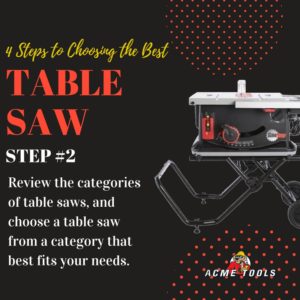
Now that you know how and where you will be using the saw, you can review the main categories of table saws to determine which meets your objectives. Three main categories are portable table saws, contractor table saws, and cabinet table saws. Knowing what category of table saw you need is essential because each table saw is designed for different skill levels and workloads. Choosing a table saw from the correct category can save you time and money and help you improve your efficiency.
Portable Top Saws:
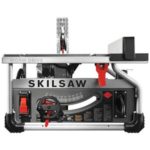
Tabletop saws, often called portable saws or bench-top saws, are the smallest and lightest, and are most often used by DIYers and professionals making construction-type cuts but also want easy portability and storage. Most portable table saws will not overtax a home electrical system, so they can be operated on a portable stand or workbench. However, they still pack a punch and can help you get the job done!
Contractor Table Saws:
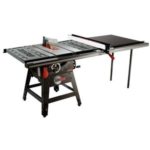
Contractor table saws are a popular choice for both DIYers and professionals. Most come with 1 – 2 horsepower motors that provide enough power for all tasks. At two hundred – to three hundred pounds, they feature heavy-duty parts that offer durability and accuracy, making them more heavy-duty and robust than a portable table saw. One of the best features of contractor table saws is that they are spacious and provide good support for larger projects. Many come with superb fences as a standard feature. They also can run off standard residential 120V voltage, making them an ideal table saw for work and play.
Cabinet Saws:
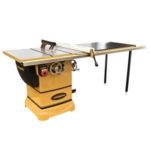
Cabinet table saws are the “King Kong” of the shop and are preferred by someone who is into serious woodworking- likely a professional woodworker or contractor. Simply put, these saws can do it all. They are powerful (typically three -5 horsepower) and highly accurate. There are many choices for large table extensions and outfeed tables. These machines require a substantial amount of dedicated space because, at 450 pounds, they are not mobile. You should also check if you can handle the amp and voltage requirements.
Step 3#: Decide What Table Saw Features Are Important To You
If you have selected the category you want, it is time to choose a specific saw. This all boils down to product features and personal preference. Here is a run-down on the most common features to consider:
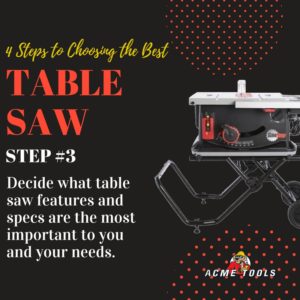
Flat top:
Accurate cuts demand a flat table. Check the saw’s flatness deviation (0.005” is typically acceptable for a cabinet saw).
Fence type:
The rip fence should lock down solidly and perfectly parallel to the blade. If a good fence does not come with the saw, you may be able to purchase an upgraded one for it.
Miter gauge:
Look for an accurate miter gauge with 45 and 90-degree stops. Also, ensure the saw has a miter gauge slot on the table perfectly parallel to the blade.
Dust collection:
If you are using the saw inside, make sure the saw has a dust port to connect a vacuum or dust collector.
Power:
Know what you might want to cut in the future. Make sure your saw is powerful enough for the task.
Wing additions:
For contractor and cabinet saws, you may want to ensure auxiliary side and outfeed tables can be easily attached.
Blade factors:
Consider how the blade is changed. You may switch blades often and want this process to be easy. Also, if you make grooved cuts, ensure the table can handle a dado blade.
Bevel capability:
To make angled cuts most table saws allow you to tilt the blade to the left for angled cuts. With some, you tilt the blade to the right. This is a matter of personal preference. In either case, adjusting the exact angle should be straightforward.
Safety:
Table saws are safe when used properly with all guards in place. However, if you are concerned about added protection, consider a saw with an automatic blade brake that instantaneously engages when the blade encounters skin.
Step #4: Always Research!
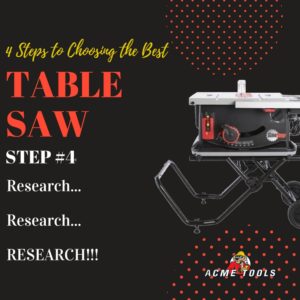
Knowledge is power. You have heard that before, but it could not be more accurate. Knowing exactly what you need will help you “do your best work” and may help you save some money, too! It never hurts to keep researching table saws to ensure you get the best one! Speaking of research, we are the destination for all things table saws. Visit the Acme Tools blog to learn all about table saws, including our list of the best table saws in 2018, news about the newest ones, tips for using your table saw, and more. The moral of the story is never stop learning!
Visit AcmeTools.com to shop for table saws, saw blades, and more today

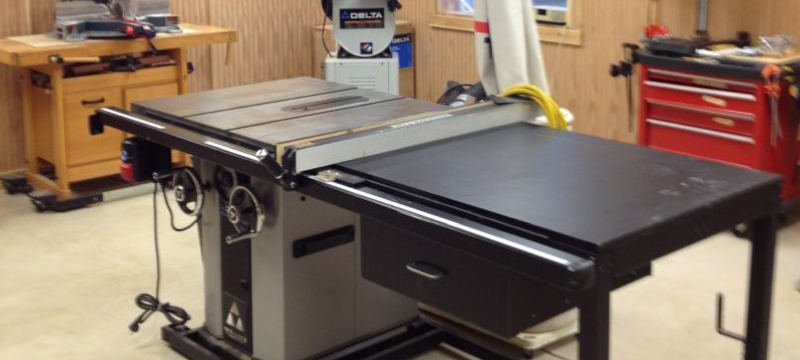
One Comment
Alfonso Maytorena
February 7, 2022 at 8:42 pmBusco una mesa de sierra Table Saw
De 52 pulgadas